- Could Your Grocery Store Meat Be Causing Recurring UTIs?
- Are You Making This Expensive Thermostat Error This Winter?
- Recognizing the Signs of Hypothyroidism
- 10 Strategies to Overcome Insomnia
- Could Artificial Sweeteners Be Aging the Brain Faster?
- Techniques for Soothing Your Nervous System
- Does the Water in Your House Smell Funny? Here’s Why
- Can a Daily Dose of Apple Cider Vinegar Actually Aid Weight Loss?
- 6 Health Beverages That Can Actually Spike Your Blood Sugar
- Treatment Options for Social Anxiety Disorder
Mom’s Response to Baby’s Cry a Matter of Memory

A mother’s response to her baby’s crying may be influenced by her own childhood, a new study reports.
The research involved 259 first-time mothers who were followed from pregnancy until their babies were 6 months old. It was conducted by researchers at the University of North Carolina at Greensboro and colleagues at Fuller Theological Seminary and Hebrew University of Jerusalem.
Mothers who had their own positive childhood experiences with caregivers and those who had come to terms with negative experiences were more infant-oriented when they saw videos of babies crying. And they responded more sensitively to their own babies’ needs, according to the study in the journal Child Development.
Expectant mothers who had a history of depression or difficulty controlling their emotions responded to the videos of babies crying by focusing on themselves rather than on the upset babies. The same was true of expectant mothers who had trouble controlling their stress while watching the videos.
The researchers also found that expectant mothers who had such negative responses to the videos were less sensitive to their own infants when the babies were 6 months old.
“Responding sensitively to infant crying is a difficult yet important task,” study leader Esther Leerkes, a professor of human development and family studies at the University of North Carolina, said in a journal news release. “Some mothers may need help controlling their own distress and interpreting babies’ crying as an attempt to communicate need or discomfort.”
Leerkes suggested that help can be found through “home visiting programs or parenting classes that help parents become more aware of stress and teach ways to reduce it, as well as individualized parent education efforts.”
More information
The U.S. National Library of Medicine has more about infants and crying.
Source: HealthDay
Copyright © 2026 HealthDay. All rights reserved.










